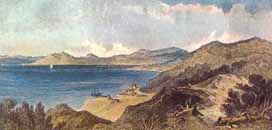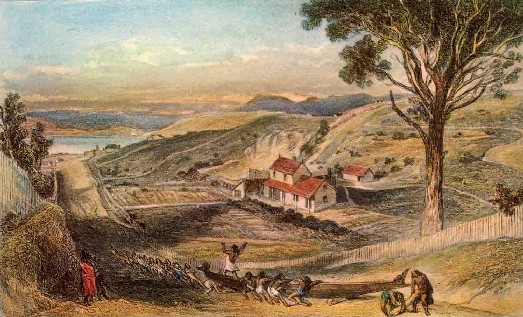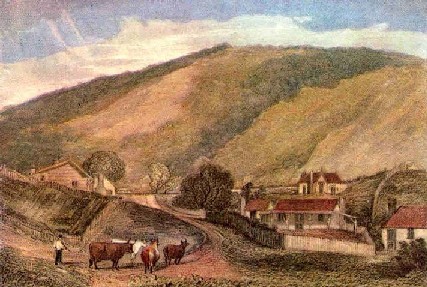 | Twelve months in Wellington / by John Wood (1843)
Narrative continued |
| Contents: preface | introduction | narrative page 1 | chapters: 1 | 2 | 3 | 4 | 5 | 6 | 7 | 8 | 9 | |
Four months had now elapsed in the pursuit of such information as would enable us to form an opinion of the settlement, and if this is no easy task upon the spot, how much more difficult in this country. After a long sea voyage the eye does not see things exactly as they are; and a residence of some months is necessary to dissipate this optical delusion. When the scales had fallen from our eyes, we perceived certain influences at work to cry up the New Zealand Company's settlements by other methods than a plain straight-forward description of their advantages and defects. We will first trace what may be called the home machinery. At the Adelphi, in the Strand, the Company skilfully laid the ground-work of their future operations. From this spot issued those publications, collated from every source, where anything favourable was said of New Zealand. The country was declared a paradise - its inhabitants not merely a superior race of savages, but astronomers. (Footnote 2)
To these exhibitions succeeded high-coloured reports, in which facts are so distorted that the colonist is perfectly astounded at what he reads. Then followed the lure of a large dividend from their profits in the emigration trade, professedly derived from a settlement where, at that time, nothing but garden-stuff had been produced. We might go on with our home enumeration, but shall now briefly advert to the minor agency at work in New Zealand. At the head of these stands the press. Materials for a paper are carried out by the first body of settlers ; and soon afterwards their friends are apprised of the great advancement of the infant settlement, as an evidence of which they are told that it already possessed a bi-weekly newspaper. To us its office appeared three-fold ; to abuse the local government, bewilder the settler, and laud the New Zealand Company. Next stands the Union Bank of Australia. There is a branch of this establishment in Wellington, but it is time the public should be told that the advantages to be derived from it are nearly all of a negative kind. This branch gives no interest upon deposits. If you pay in sovereigns, 2 per cent is charged to get them back ; and if you remove to any of the Australian colonies, the same charge is made for a hill payable thirty days after sight. True, you can get it discounted, but for this accommodation you are charged an additional 10 per cent. Even the current notes of this bank are made payable in Sydney thirty days after presentation at a charge of 2 per cent., so that in Wellington you cannot demand specie for a New Zealand Bank note. The Australian colonies, it was thought, would help to people Wellington. But the tide of re-emigration has set in an opposite direction. It may suit the Gazette to characterize such "as the few malcontents and others who have left Port Nicholson were generally persons who would not have benefited their benefactors; and many who have left are now quite sensible of their error, and are returning with as much expedition as their diminished finances will enable them to do." In the vessel which took us to Sydney there were eight cabin passengers who left Wellington, two of whom were capitalists from Yorkshire, one a son of Lord Stratford, another a cousin of Mr. Ward, secretary of the New Zealand Company, and two merchants. But the above extract has reference to mechanics and labourers. While we were in Sydney the Clydeside brought over nineteen in the steerage, the Vanguard thirty-four, the Bright Planet, a considerable number, and the Sisters nine, besides her cabin passengers. Tonnage. - We have here another specious but fictitious sign of prosperity. Had it suited the New Zealand Company to have put flown their emigrants upon one of the many barren rocks off the west coast of Ireland, the amount of tonnage would nearly have registered as high ; for at Port Nicholson there is no article of export, and the return consists of the vessels which took the people out, or emigrant ships; those that bring them food, or foreign traders; and coasters, the last only being of any real utility. Letters from settlers often appear in the London New Zealand Journal. The authors of these insidious productions are the Company's leading men - agents for absentees, mace certain of the labouring class. Some of these have been collected into a volume, and widely disseminated. The felicitous tongue of George Robins is here outdone, and wherever an expression stronger than another occurs, it is put in italics, but of course the Company had nothing to do with this. Post Office. - How is it you do not send your friends in England a statement of the position of affairs at Port Nicholson is a question we often asked. The invariable reply was, we have done so over and over again ; but somehow or other our letters never reach their destination, or, if they do, garbled extracts only are laid before the public. The doings of this department at the commencement of the settlement would be incredible, were it not that we have the information from sources above suspicion. The two years which succeeded the arrival of the first settlers at Port Nicholson were spent in melancholy forebodings by their friends at home. No letters were received upon which much dependence could be placed; and this darkness was only deepened by the gilded paragraphs which flashed hut to dazzle in the columns of the New Zealand Journal. Sometimes a solitary epistle would find its way to a district, whence a dozen families had emigrated with the writer. The welcome messenger kindled the sympathies of a neighbourhood, and for it many hearts were thankful. But of these favoured letters, few and far between, it was remarked that they all spoke one language, that of unexampled success, and hence arose a suspicion that in New Zealand, as else-where, "all is not gold that glitters." The establishment of a post-office, under a goverment officer, has somewhat remedied these defects. In England the character of New Zealand is becoming better known, and to this nothing has more contributed than the works of Terry, Esq., F.R.S., and Ernest Diffenbach, Esq., books of a very different stamp from many party pamphlets that have lately been published on the Company's settlements. Busy-Bodies. - A useful class in Port Nicholson, and we presume in all the settlements in Cook's Straits. They dog the steps of new arrivals, depict the country beyond the mountains as a perfect Paradise, and sum up by strongly advising you either at once to build upon your town acre, or settle on a country section. Their motto is, "Don't do as we do, but do as we desire you." Promisers. - As you look round upon the mountainous amphitheatre which encloses Wellington perhaps your temper gets ruffled. On such occasion one of this class is seldom far from your elbow, and you are told, as we were by a member of the Wellington bar, that thirty-three emigrant ships were expected to arrive in 1842, or by the Company's agent that he expected to rend some of these vessels back laden with colonial produce. (Footnote 3) But Port Nicholson is not so much a land of promise as of hope and expectation. The cleared country produces only fern, but we hope it may grow grass ; and the forest land, when tilled, promises good crops of grain. Flax, it is confidently expected, will be a valuable export, and the settler, after being promised his land for nearly four years, got paper possession of it in January last. The Company's agent promises roads, and the settlement of the native question, while hopes are high that the Company's exertions in England will yet mar the prosperity of Auckland, and establish the seat of government in Wellington. Money Loans. - The tactics of the New Zealand Company in wishing others to undertake this responsibility should open the eves of the English capitalist. Does any one think that the Company would not monopolize this also were the prospect of ultimate gain less chimerical than it is? Look at their conduct with reference to the Chatham Islands, and say if moderation be one of their cardinal virtues.
 Price of Town Acres. - The great value of town lots in Wellington is another topic of panegyric, and accordingly in the Company's fifth report, we are told that the beach frontage was letting for £l. per lineal foot. An Auckland paper rests the prosperity of that place on a firmer foundation. "The acquirement of a personal right to bits of land is a poor progress in the scheme of colonization - our business is to disperse. The entrances and exits to 'Hobson's choice' are not circumscribed. We have neither inaccessible mountains nor impenetrable forests to cage us within the confines of our capital ; on the contrary, the rich bosom of a luxuriant country courts our occupation, - the liberal lap of nature requires but unfolding to render forth abundance and to spare, - it will be time to purchase allotments by the foot, and to measure public avenues by the inch, when we have manufacturing towns, - when an exchange of commodities is effected in our seaports, - when our harbours are frequented by customers, as well as by vessels laden with foreign supplies, - in short, when the plough has given us an export." Company's Agents. - A thousand pounds are drawn yearly from the settler's pockets to pay the Wellington agent; and a sum nearly as large is wrung for a similar purpose from the Nelson colonists. Now these men are merely colonial news writers, or at most emigrant agents, and receive such high salaries for no reason that we or any uninterested person who has seen the Company's settlements can assign beyond their relationship to Gibbon Wakefield, the great pillar of the edifice. The despatches of their principal agent have been useful instruments in the hands of the directors; but beyond this we failed to detect, during our residence in Wellington, any tangible good accruing to the settlement from his presence. He however fulfils his instructions, and accordingly we are told "that Colonel Wakefield still continues to conduct the Company's affairs with admirable tact and discretion," which a bona fide settler would interpret to mean - nothing, or a constant shifting of responsibility from the Company to the Government. He is powerless for good, and his lethargic conduct is anything but satisfactory to the colonists unconnected with the Company. His brother at Nelsen, is far more energetic, and from all we heard appears to give very general satisfaction. Names. - There are some associated with the Company's settlements in New Zealand to which that body are much indebted. These are Molesworth, Petre, Duppa, and Sinclair ; and the English public would perhaps like to hear something of their New Zealand estates. Mr. Molesworth has certainly set a good example, and cleared more forest land than any other individual among the settlers. The Gazette affirms that it pays him. His "clearing" may be called the Company's experimental farm, for every new comer is invited by that fraternity to visit the Hutt and see what Molesworth has done. The Honourable Mr. Petre has not cleared an acre of land, but published a pamphlet in support of his party. Mr. Duppa. - This gentleman has found cattle-dealing and jobbing in pigs more profitable than waging war with a New Zealand forest. His house, or "Castle Doleful," stands upon the beach with less than two acres of ground about it. Immediately behind the house rise steep hills ; before it lie rocks and the sea. This dreary looking spot is dignified with the name of Oriental Bay. When the Mandarin first east anchor in Port Nicholson, an observation made to me by a shrewd fellow passenger was, pointing to Castle Doleful "That's enough for me; there is not much to be done in agriculture when Mr. Duppa has set himself down there." (Footnote 4) Mr. Sinclair, to use the gentleman's own expression, has turned land-jobber. He is too shrewd to be guilty of clearing land in New Zealand either with a view to sell or cultivate. Trade and Investment of Capital. - Comparing small things with great, the English merchant who consigns goods to Port Nicholson, must be prepared for even greater risk than attends a consignment to the Australian colonies. The latter do make a large return in wool, but the former have virtually nothing, what oil and whalebone they can get being usually clue to the Sydney merchant, or nearest creditor. The place has hitherto been kept up solely by the arrival of successive emigrant ships, and the English gold brought with them. But there arrivals become less frequent, and, despite the assertion of Gibbon Wakefield, "That if you can only fill a ship's 'tween decks with labourers, her cabins are sure to fill with passengers," vessels do now arrive, and at the Company's settlements in New Zealand too, without bringing a single cabin passenger. (Footnote 5) But people must eat and be clothed, and there being nothing to give in exchange for these necessaries of life, the capital of the settler is gradually lessening. What New Zealand loses, South America and New South Wales gain. There is, however, no lack of enterprise among the settlers, but their energies have been hitherto sadly cramped by their false and anomalous position. Had the community of Port Nicholson the countenance of a Government instead of a chartered Company, aspiring to the prerogative of the former, but hitherto dead to every interest but its own, (Footnote 6) Wellington, with all its drawbacks, would continue to prosper : as it is, the place owns two vessels of considerable tonnage, besides a number of small coasting craft. The germ of advancement is there, and it remains with the Company to make or mar the place.
Footnotes |

